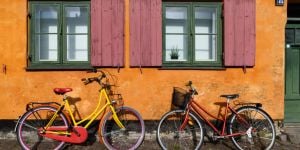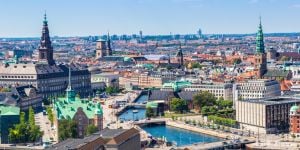
Denmark remains on the list of the top ten happiest countries in the world, coming in at an impressive second place in 2019. From untouched natural beauty to well-developed transport systems and a prosperous social system, it's easy to understand why Denmark is a top destination for expatriates from all over the globe.
Do you have a specific question about everyday life in Denmark? Check out Expat.com's forum.
Balance and equality in Denmark
From equality in the workplace to shared chores, the Danes have mastered the art of balance. Denmark's society scores high in tolerance and low in discrimination, and Danes enjoy a good level of work-life balance.
Men and women tend to share tasks like household chores and child-rearing, a balance which is reflected in near-equal employment rates for men and women in the labour market. People are considered equal regardless of their position in society.
Ecology in Denmark
Denmark is one of the leading nations in green technology, with the city of Aalborg committed to researching and implementing renewable and clean energy resources. A similar focus on green agriculture means that organic products are competitively priced and widely available. Enjoying the outdoors is part of the Danish lifestyle, and great efforts are made to preserve natural ecosystems.
Hygge
The Danish trend of ‘hygge' has taken the world by storm. Although the word is translated to mean ‘cosy' and ‘cosiness', it refers more to a lifestyle that is at the heart of every Danish citizen. It includes the sentiment of welcoming others to spend time together in a warm atmosphere, enjoying comfort, and feeling safe and at home.
The term has become so popular that there are books dedicated to the subject. Expats in Denmark will get their first taste of hygge soon enough; simply visit a cosy bar filled with locals on a cold evening, or cuddle up on the couch with a cup of cocoa and wool socks when the first cold night of winter sets in.
The Danish cuisine
Danes are practical people who carry on strong traditions of homemade cuisine that reflects a history of harsh winters and hard work. Staple foods include potatoes and cabbage, with pork, herring, and rye bread remaining lunchtime favourites.
A classic Danish meal is ‘smørrebrod', an open-faced sandwich of rye bread (‘rugbrød') with toppings such as pickled herring (‘sild'), pork, or cold meats and cheese.
Other Danish favourites include hot dogs from a ‘pølsevogn', pan-fried meatballs or ‘frikadeller', and wienerbrød pastry. These are inexpensive treats that can be found at convenience stores around most major cities in Denmark.
An invitation to spend Christmas dinner with a Danish family is the perfect opportunity to experience hygge and try some traditional Danish foods. Guests can expect to see favourites like andesteg (roast duck), rødkål (red cabbage with spices and vinegar), and potatoes cooked in any of several methods like caramelised, roasted, or baked.
Public holidays and celebrations in Denmark
The majority of Danish public holidays are religious in origin and include Easter, Pentecost, Ascension Day and Christmas. Although many Danes are not particularly religious and outspoken religious conversations are rare, there are several religious public holidays observed throughout the year. Many Danes celebrate together with family at their homes.
Another Danish holiday is ‘grundlovsdag', or constitution day. June 5 is the Danish Constitution Day and commemorates the adoption of the first Danish Constitution in 1849. However, it is not an official public holiday, and private companies may decide whether employees get time off.
Festivals and events in Denmark
Festivals and music events make Danish cities come alive, especially in the summertime. Various cities host major events in different genres; from jazz and rock music to food festivals and opera shows, there is something to suit every taste. Check online to find out about events near you.
Associations and clubs in Denmark
One of the best ways to adapt to the Danish lifestyle is by joining a club or association. As an expat, it can be intimidating to join a Danish group, but luckily, there are associations and clubs with locals and expats in nearly every city.
There are groups for sports activities like soccer and running, music clubs, religious groups, activities for kids, and many more. Joining a Danish language talk club or café is a great way to meet fellow expats while learning the local language. Check for more associations and clubs in your location on the Meetup website.
We do our best to provide accurate and up to date information. However, if you have noticed any inaccuracies in this article, please let us know in the comments section below.








